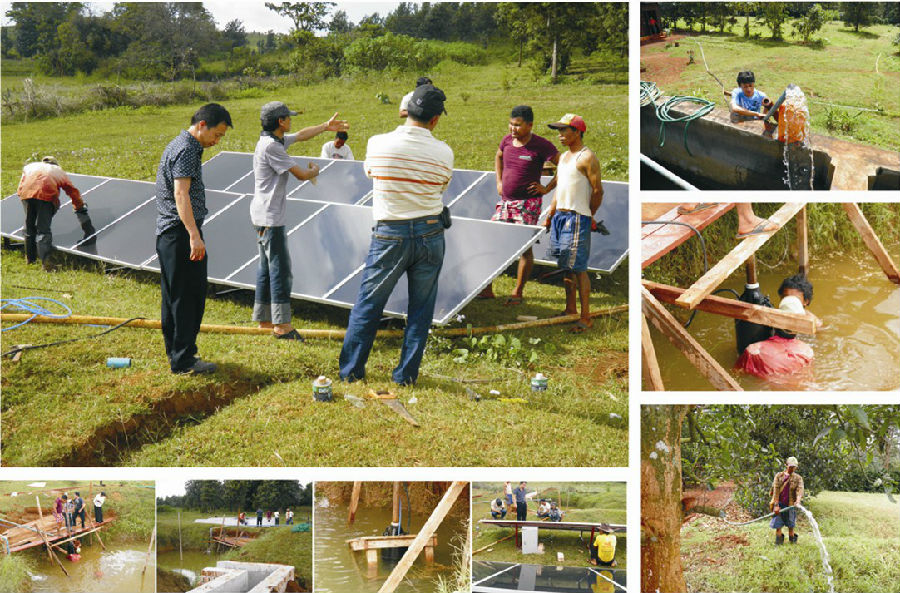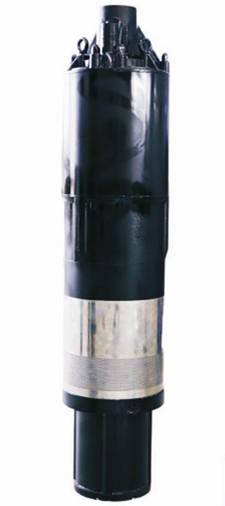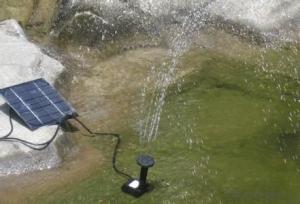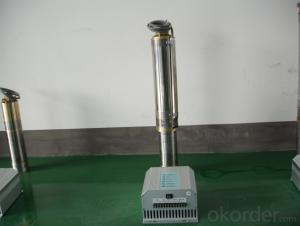Lorentz Solar Pump 3DS-10-100
- Loading Port:
- China Main Port
- Payment Terms:
- TT OR LC
- Min Order Qty:
- -
- Supply Capability:
- 300 sets /month
OKorder Service Pledge
OKorder Financial Service
You Might Also Like
Product description:
Product: Solar water pump
Model:3DS-10
 Appilication:
Appilication:
submersible pump
for deep well or water tank or pond or small lake
for irrigation of a farm cover around 5000 m2
For all kinds of irrigation: flood /sprinkling/ drip
Product specification:
flow rate:4000 liter/ hour, 32m3/day.
lift: 50m-100m
pump diameter: 238mm
well diameter more than 250mm
with BLDC motor, motor power:2000W
but only need solar power:960W, our pump can save more than 50% solar panel power.
Material:
Pump inside: stainless steel and wearable nylon,it enables our solar pump to have 10 years sevice life.
Motor length:30cm,80% shorter than other motors. So that you can pump 80% more water by our solar pump.
Certification:
3 International patent
ISO9001
CE
Warranty:2 years
- Q: Can a solar pump be used in areas with limited access to electricity for backup systems?
- Yes, a solar pump can be used in areas with limited access to electricity for backup systems. Solar pumps rely on solar energy to operate, making them ideal for remote areas without reliable electricity supply. They can provide a sustainable and cost-effective solution for water pumping needs in such areas, ensuring access to water even during power outages or when grid electricity is unavailable.
- Q: Can a solar pump be used in areas with high levels of sand in the water?
- Yes, a solar pump can still be used in areas with high levels of sand in the water. However, it is important to carefully choose a solar pump model that is designed to handle such conditions. Look for pumps with features like built-in filters or specially designed impellers that can prevent clogging and damage caused by sand particles. Regular maintenance and cleaning of the pump may also be required to ensure its smooth functioning in sandy water areas.
- Q: Can a solar pump be used for wastewater recycling?
- Yes, a solar pump can be used for wastewater recycling. Solar-powered pumps are an eco-friendly and cost-effective solution for pumping and treating wastewater. They can efficiently move the water from one location to another, facilitating the recycling process. Additionally, solar pumps eliminate the need for electricity, reducing the operating costs and environmental impact associated with traditional pumps.
- Q: Can a solar pump be used in combination with a storage tank?
- Certainly, a storage tank can be used in conjunction with a solar pump. In fact, utilizing a storage tank alongside a solar pump can greatly enhance the utilization of solar energy and guarantee a consistent water supply. When a solar pump is employed, the sun's energy powers the pump, enabling it to transfer water from a source (such as a well or a river) to a desired location. By connecting the solar pump to a storage tank, surplus water can be stored during times of abundant sunlight and subsequently utilized during periods of reduced sunlight or increased water demand. The storage tank functions as a reservoir for storing water that has been pumped by the solar pump. This ensures an uninterrupted water supply, even during nighttime or cloudy days when the solar panel may not generate sufficient energy to power the pump. The water stored in the tank can be employed for various purposes, including irrigation, livestock watering, or even household usage. Furthermore, the combination of a storage tank and a solar pump helps to mitigate the impact of fluctuations in water availability. It provides a buffer, allowing water to be stored during times of abundance and used during periods of scarcity. This can be especially advantageous in regions with seasonal variations in water availability or unreliable water sources. In conclusion, the integration of a storage tank with a solar pump is a practical and efficient solution for optimizing the use of solar energy and ensuring a consistent water supply. It allows for water to be stored during periods of ample sunlight and used during times of reduced sunlight or increased water demand, guaranteeing a continuous water supply regardless of fluctuations in solar energy availability.
- Q: Can a solar pump be used for irrigation in saline soils?
- Yes, a solar pump can be used for irrigation in saline soils. However, it is important to consider the salinity levels and the specific requirements of the crop being irrigated. Saline soils can pose challenges for plant growth due to the high salt concentration, which can affect water uptake and nutrient absorption. To mitigate these issues, appropriate irrigation management practices, such as using a solar pump with a filtration system or implementing proper drainage techniques, may be necessary. Additionally, selecting salt-tolerant crops can also help optimize irrigation in saline soils.
- Q: Can a solar pump be used for water supply in off-grid boats?
- Yes, a solar pump can be used for water supply in off-grid boats. Solar pumps are designed to operate using energy from the sun, making them a suitable and sustainable option for providing water on boats without access to traditional power sources. They can be used to draw water from a source such as a river or a well and supply it to various parts of the boat, such as the kitchen or bathroom, ensuring a reliable water supply while being environmentally friendly.
- Q: What are the different types of solar pumps available?
- There are various types of solar pumps available, including submersible solar pumps, surface solar pumps, and floating solar pumps. Submersible solar pumps are designed to be placed underwater and are commonly used in wells, boreholes, or reservoirs. Surface solar pumps are placed above ground and are suitable for pumping water from lakes, rivers, or tanks. Floating solar pumps are specifically designed for bodies of water and are often used for irrigation or water circulation purposes.
- Q: Can a solar pump be used for water supply in military installations?
- Absolutely, water supply in military installations can indeed be achieved with the use of a solar pump. By harnessing energy from the sun, solar pumps offer a sustainable and reliable solution for water distribution. The constant and secure water source required by military installations can be effectively met by solar pumps. There are numerous benefits associated with utilizing solar pumps in military installations. Firstly, solar pumps operate independently of the electric grid, enabling their use in remote areas or during power outages. This is particularly advantageous for military bases located in isolated regions or places with an unstable power supply. Moreover, solar pumps prove to be cost-effective and environmentally conscious. By utilizing renewable energy, they reduce reliance on fossil fuels and minimize carbon emissions. This aligns perfectly with the military's growing emphasis on sustainability and reducing its environmental impact. Furthermore, solar pumps are low-maintenance and boast a long lifespan. They require minimal upkeep and are specifically designed to withstand harsh conditions, rendering them suitable for military installations operating in challenging environments. In conclusion, a solar pump presents an exceptionally viable option for water supply in military installations. Its ability to operate independently of the electric grid, cost-effectiveness, eco-friendliness, and low-maintenance nature make it an ideal choice for meeting the water requirements of military bases.
- Q: Are there any limitations to the size of the water reservoir that a solar pump can fill?
- Yes, there are limitations to the size of the water reservoir that a solar pump can fill. The size of the water reservoir that a solar pump can fill depends on several factors such as the power output of the solar panels, the efficiency of the pump, and the amount of sunlight available. Solar pumps are typically designed for small to medium-scale applications, such as supplying water for livestock, irrigation, or domestic use. These pumps usually have a limited power output, which means they may not be able to fill large water reservoirs efficiently. Additionally, the efficiency of the pump plays a role in determining the size of the reservoir that can be filled. Some solar pumps may have a lower flow rate, which can limit the amount of water they can transfer to a reservoir within a given time frame. Furthermore, the availability of sunlight affects the performance of solar pumps. If the pump is located in an area with limited sunlight or if there are frequent cloudy days, the pump's ability to fill a large reservoir may be compromised. Therefore, while solar pumps provide a sustainable and environmentally friendly solution for pumping water, they do have limitations in terms of the size of the water reservoir they can effectively fill. It is important to consider these factors when determining the appropriate size and application for a solar pump.
- Q: Can a solar pump be used for water supply in off-grid cabins or remote cottages?
- Yes, a solar pump can be used for water supply in off-grid cabins or remote cottages. Solar pumps are a sustainable and cost-effective solution for these remote locations where access to conventional power sources may be limited. By harnessing energy from the sun, solar pumps can draw water from wells or other water sources and provide a reliable water supply for daily needs such as drinking, cleaning, and irrigation.
Send your message to us
Lorentz Solar Pump 3DS-10-100
- Loading Port:
- China Main Port
- Payment Terms:
- TT OR LC
- Min Order Qty:
- -
- Supply Capability:
- 300 sets /month
OKorder Service Pledge
OKorder Financial Service
Similar products
Hot products
Hot Searches
Related keywords





















